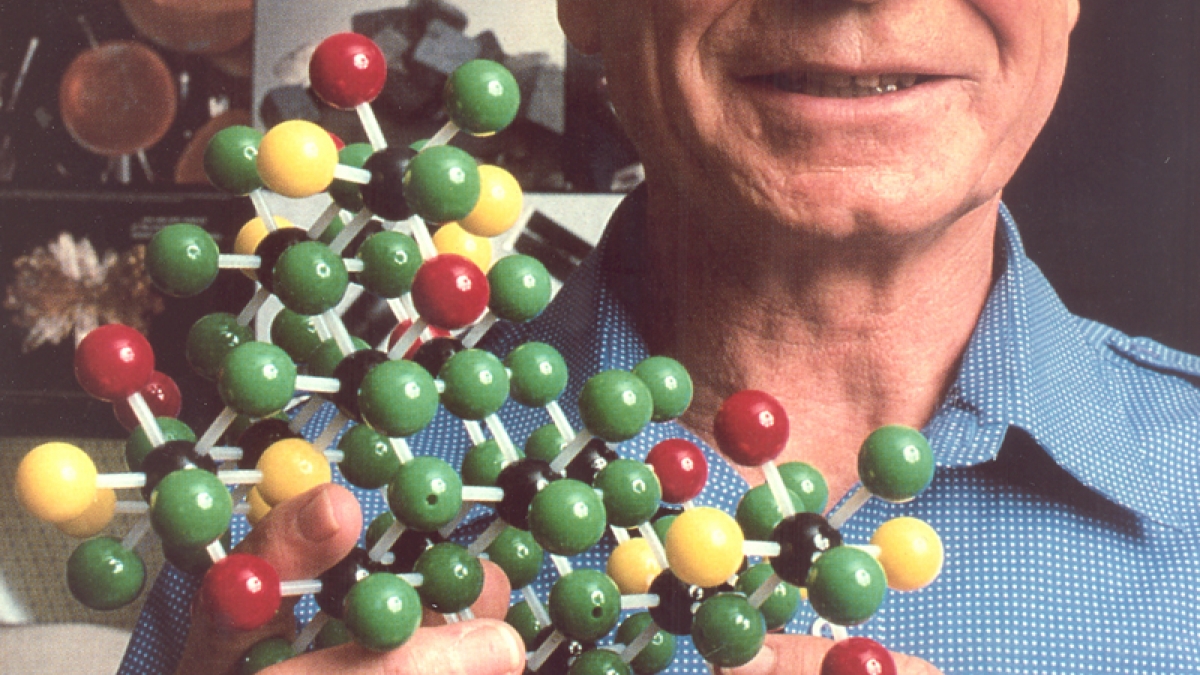Award-winning Regents' Professor to deliver Eyring Lecture

C. Austen Angell explores ‘world’s weirdest liquid,’ helps kick off endowment campaign
C. Austen Angell, an ASU Regents’ Professor of Chemistry and Biochemistry, in the College of Liberal Arts and Sciences – and with five internationally contested awards, one of ASU’s most recognized scientists – will be the featured Eyring Lecture Series speaker, Oct. 27, on ASU’s Tempe campus.
A pioneer in the field of glasses and liquids, Angell will present, “Cold water: world’s weirdest liquid.” He will remind us that most of our universe’s water actually exists in the glassy state (on intergalactic dust particles).
The lecture will be presented at 7:30 p.m., in the Bateman Physical Sciences building, H150, and marks the kickoff of a new phase in an endowment campaign designed to ensure the future longevity of the annual lecture series, which began in 1989.
“There is so much water around that we get used to it and forget how unusual it is,” Angell says. “Water is the only liquid that can also exist as a solid, or ice, and as a gas, or steam, under terrestrial conditions.
"What is it about the water molecule that makes it so unique? This is what we’ll try to explain.”
Angell joined the ASU faculty in 1989 as a professor of chemistry after serving in the same capacity at Purdue University for nearly 20 years. While he has worked mostly on glass-forming liquids and water, he has also published on geochemical, biophysical and particularly electrochemical research for which he recently won the Bredig Award of the Electrochemical Society.
He has previously been honored with the David Turnbull award from the Materials Research Society in 2007, the Joel Henry Hildebrand award from the American Chemical Society in 2004, and the George Morey award from the American Ceramic Society in 1990.
The Eyring Lectures in Chemistry and Biochemistry is an interdisciplinary distinguished lecture series dedicated to stimulating discussion by renowned scientists who are at the cutting edge of their respective fields. Each series consists of a lead-off presentation to help communicate the excitement and the challenge of this central science to the university and community. Past lecturers have included Nobel Laureates Ahmed Zewail, Jean-Marie Lehn, Harry Gray, Richard Smalley and Yuan T. Lee.
Bill Glaunsinger, who chaired the Department of Chemistry and Biochemistry when the Eyring series originally launched, says that an endowment for the twice-annual lectures are valuable on many levels. “It is important to support value-added experiences like this that are critical to undergraduate students, graduate students, faculty and public education.
Through these lectures, we have identified and attracted outstanding scientists at the cutting edge of their disciplines. The series enriches both undergraduate and graduate education, faculty interactions and community outreach.”
The endowment is named in honor of the late Leroy Eyring, an ASU Regents’ Professor of Chemistry and former department chair, whose instructional and research accomplishments and professional leadership at ASU helped to bring the Department of Chemistry and Biochemistry into international prominence. The Leroy Eyring Center for Solid State Science at ASU is named in his honor.
The endowment campaign is being spearheaded by Glaunsinger and current department chair William Petuskey.
“Leroy Eyring was special in so many ways,” says Glaunsinger, who was a student in Eyring’s classroom in the 70s and was later hired as a faculty member by Eyring. “As the department chair he led the development of the graduate program and created the Center for Solid State Science. He was the consummate mentor, and always encouraged his students and associates to be creative. He was a real gentleman and considerate of others.
"To realize an endowment that would ensure these lectures will continue in perpetuity would be a wonderful tribute to Dr. Eyring.”
“After 22 years,” says William Petuskey, “the Eyring Lecture Series has become one of the premiere scientific events in metropolitan Phoenix. It is developing a tradition of excellence that is well recognized beyond the state and the U.S. and helps focus attention on the academic and cultural vitality that is present at ASU”.
For more information on the Oct. 27 lecture, visit http://chemistry.asu.edu/seminar/eyring.asp.

